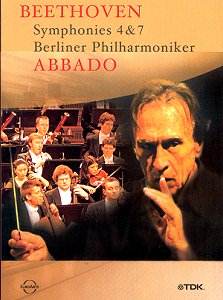This
is the last issue in the complete Beethoven Symphonies recorded
in Rome in 2001 by Abbado and his orchestra. They use the same
editions of the Symphonies (Jonathan Del Mar) as they did in the
CD versions. These gave Abbado a chance to review his approach
to these masterpieces. The new edition goes back to the original
manuscripts and subsequent corrections by the composer as well
as other published editions. In truth, without comparing the new
edition with the old, the changes are of a relatively minor nature.
The average listener will be unable to tell which edition is being
used.
The
disc is supplemented by Abbado’s extremely illuminating talk on
the Symphonies and on his approach to them. There is no doubt
that he considers all of them supreme masterpieces of the symphonic
literature. The talk is enhanced with snippets from the various
symphonies taken from this and the earlier issues in this series.
He has been influenced by the ‘period brigade’, shown by his reduction
in the size of orchestra for the lighter works. A very interesting
point which he makes about his performances is that the Berlin
Philharmonic has only about 20% of the players that were there
before he took over as chief conductor. Most of the new members
have been very strongly influenced by extensive experience of
playing in small orchestras or indeed chamber works. This, he
states, is one of the reasons that the ensemble playing is of
such a high calibre, encouraged as they are by him to concentrate
on what other players are doing around them, and to integrate
their playing by listening to each other.
He
talks tellingly about his surgery, and how music helped pull him
through, particularly playing Beethoven. At the end of some of
the performances in this series one can feel the exhaustion. This
is particularly noticeable at the end of the finale of the Seventh.
He talks at some length about his approach to repeats in Beethoven,
and how much he has learnt both in Berlin, and also from going
back to the original scores. All the repeats are here, and he
is quite particular in explaining how, by the use of the repeat,
Beethoven produces both growth and gradual increase in tension
and exultation in the last movement of seventh. This quality is
exceptionally present here.
As
the performances progress, one can very clearly sense the commitment
of orchestra and conductor to these works. In comparison with
Simon Rattle and the Vienna Philharmonic, I sense absolutely no
contest – Berlin 9, Vienna 0.
Abbado,
now has a wonderful rapport with his orchestra, is clearly thoroughly
enjoying himself, in spite of looking distinctly unwell as a result
of his recent serious illness. The orchestra is also clearly enjoying
itself with "edge of the seat" playing and complete
commitment to their conductor.
With
the new editions, Abbado has also elected for a much reduced size
of orchestra for the second symphony, using only three double
basses and four cellos. This sparer sound produces a lightness
in the phrasing almost, dare I say it, like a period performance.
It clearly is not a period performance but nowadays, many conductors
are absorbing what has been learnt without going the whole hog.
So here we have modern instruments, steel strings and modern brass
and woodwind instruments, driven superbly by their conductor.
The
recording quality is extremely fine, capturing the tonal splendour
of this very great orchestra to perfection. The closing in on
individual instruments in good BBC fashion enhances the listening
experience considerably.
Anyone
choosing this release is in for a very rewarding experience. It
gives one the chance to see a world class (if not the world
class) orchestra thoroughly at ease with their Music Director,
playing favourite Beethoven symphonies with maximum style and
enjoyment. Its audience is both quiet and attentive during the
performance and voracious in their reaction to them at the close,
and this is well deserved.
John
Phillips
